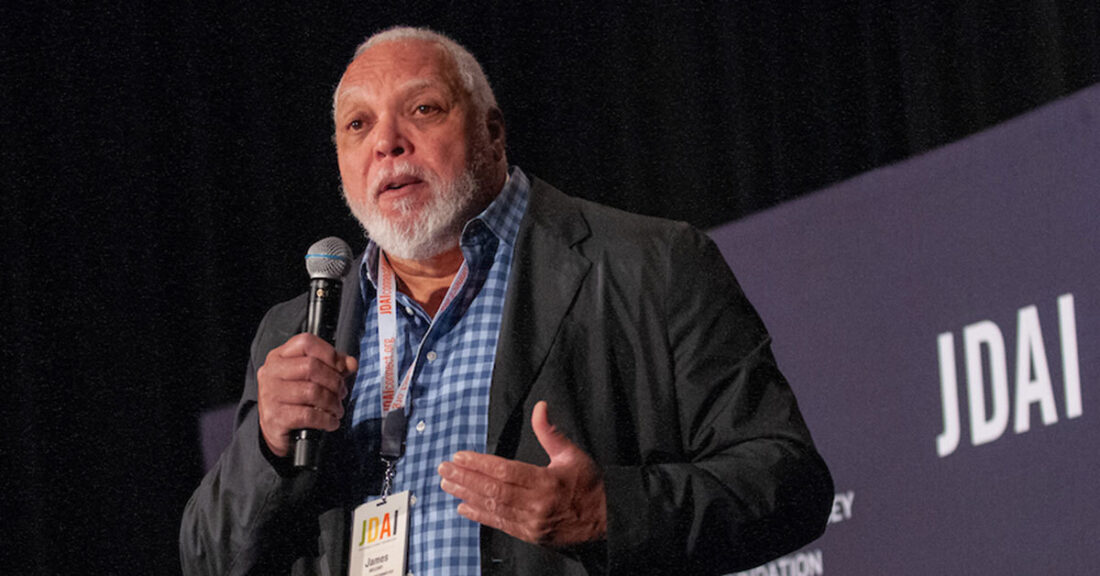From the Field: Four Ways to Transform Juvenile Justice Now

The Annie E. Casey Foundation has released videos of TED-style talks on four emerging areas of juvenile justice practice — youth partnership, credible messengers, restorative justice and healing youth trauma. The talks inspire practitioners to think differently about what’s possible within their systems and were recorded before a live audience of 800 juvenile justice practitioners and advocates at Casey’s 2019 JDAI® Inter-Site Conference.
Jarrell E. Daniels on Youth Partnership
Jarrell E. Daniels is a member of the Foundation’s Juvenile Justice Strategy Group Youth Advisory Council, a research assistant and student at Columbia University, and a 2019 Open Society Foundations Youth Activist Fellow.
Daniels emphasizes the need for authentic partnerships between youth and adults that support challenging conversations and shared problem solving. While incarcerated in New York State prison, Daniels participated in an education program in which Manhattan prosecutors and young people behind bars learned from one another. This experience inspired Daniels to create the Justice Ambassadors Youth Council at Columbia University. The council pairs formerly justice-involved young people with city officials over an eight-week period. During this time, the two groups work to develop joint policy proposals on issues affecting young people, such as coping with trauma and racial inequity. Partnering with youth “forces people to step outside of their title, their position within an agency or organization, and think like a human being again,” Daniels says. The experience “showed me how both my mind and our justice system could be transformed.”
Antonio Fernandez on Credible Messengers
In his role as a leader of the credible messenger initiative with the District of Columbia’s Department of Youth Rehabilitation Services, Antonio Fernandez connects with young people on a personal level, drawing on his own past in the criminal justice system.
Fernandez — once a leader of the Latin Kings street gang in New York City — now dedicates himself to helping D.C.-based, justice-involved youth heal and reflect on their decisions. In addition to working in neighborhoods, Fernandez and other credible messengers support youth who are in secure confinement a local facility. Fernandez challenges systems to open their doors to credible messengers to connect with young people who may be hard to reach: “Entrust us to do what you can’t do.”
Seema Gajwani on Restorative Justice
Seema Gajwani captures the power of restorative justice — an approach that brings together offenders and their victims — to help youth take responsibility for their actions and forge connections based on compassion and empathy. Gajwani, special counsel for juvenile justice reform and chief of the restorative justice program in the Office of the Attorney General for the District of Columbia, reflects on how her first restorative justice circle upended her initial skepticism. “I was floored,” she said. “Two boys and their families came to resolution with accountability and fairness in an hour-and-a-half conversation.”
Gajwani discusses research indicating that taking responsibility is fundamental to changing young people’s behavior. She also reviews restorative justice’s track record: Out of the 120 restorative justice cases that have come through her office, only seven have been returned for traditional prosecution. Her vision of a youth justice system ultimately abandons court as a default for all cases: “What if, instead, …we gave victims and offenders a chance to work things out together first?”
James McLeary on Healing From the Inside
James McLeary opens with clips from “The Work,” a 2017 documentary chronicling a four-day group therapy retreat in California’s Folsom State Prison. The retreat was part of McLeary’s ongoing work with Inside Circle, a program that promotes healing among individuals who are or have been incarcerated. McLeary — now an elder and board member of Inside Circle — walks individuals through a healing experience modeled after the methodologies of several indigenous groups.
McLeary highlights four tenets of healing shared by these groups: awareness, responsibility, accountability and visioning. He reflects on his own experiences of trauma and his personal healing journey, recalling the words of his grandmother: “If a wound is not witnessed, it will fester.”






